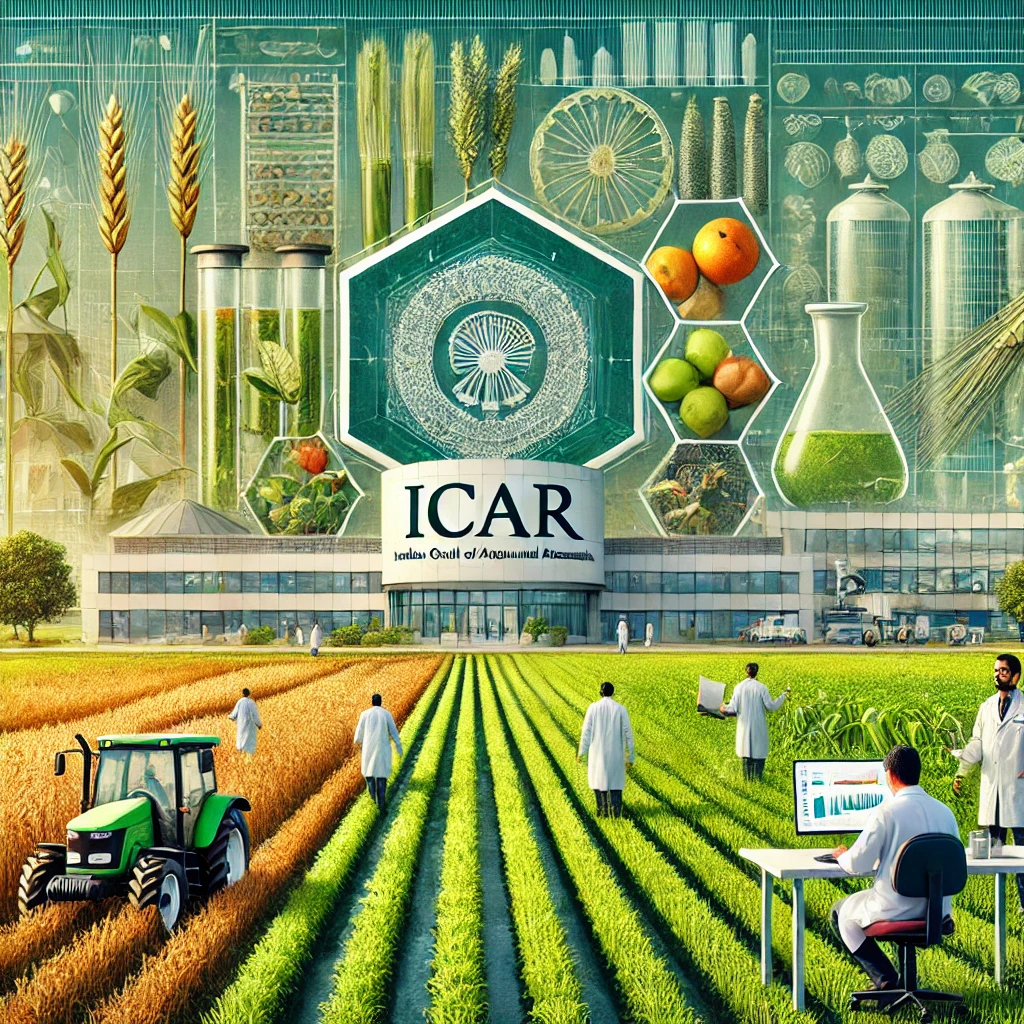The Indian Council of Agricultural Research (ICAR) is celebrated on 16th July. Established on 16 July 1929, the ICAR is an autonomous body under the Ministry of Agriculture and Farmers Welfare. The headquarters is set in New Delhi, and the body oversees 102 institutes in addition to 71 agricultural universities within India. It plays a very important role in guiding and managing research studies affecting agriculture, horticulture, fisheries, and animal sciences. Its research has contributed greatly to increasing India’s food production, covering the Green Revolution and beyond.
- The Indian Council of Agricultural Research (ICAR) goal was to improve farming education and research in India.
- ICAR launched the Green Revolution in the 1960s, which significantly increased agricultural production.
Establishment and Structure of ICAR
ICAR was established on 16 July 1929 as a registered society under the Societies Registration Act, 1860. It operates as an autonomous organization under the Department of Agricultural Research and Education (DARE), Ministry of Agriculture and Farmers Welfare. Headquartered in New Delhi, ICAR is structured to coordinate and guide agricultural research and education across the country.
Scope and Scale of ICAR
ICAR’s operations are extensive, encompassing 102 institutes and 71 agricultural universities across India. It is one of the largest national agricultural systems globally, reflecting its vast network and capacity to influence agricultural practices and policies. This scale enables ICAR to address diverse agricultural challenges and implement widespread improvements.
Role of Indian Council of Agricultural Research
ICAR has been instrumental in driving the Green Revolution and enhancing agricultural productivity in India. It serves as the apex body for coordinating research and education in agriculture, horticulture, fisheries, and animal sciences. ICAR’s efforts have significantly increased the production of food grains, horticultural crops, fish, milk, and eggs from 1950-51 to 2017-18, showcasing its critical role in ensuring food security.
- ICAR conducts research to improve farming and helps farmers overcome any problems.
- The Indian Council of Agricultural Research aspires to environment-friendly farming and hence uses techniques for organic farming and pest control that do not harm nature.
- ICAR disseminates newly developed agriculture technologies amongst farmers through science centers and Universities.
- ICAR imparts training programs and workshops to farmers regarding the latest methodologies of farming.
- It educates people working in agriculture and helps them to learn more and be better at their work. It works together with other organizations and universities by sharing knowledge and doing research together.
- ICAR advises the government to make good decisions about agriculture using science as the basis for its advice.
- ICAR is concerned with the quality of the crops and the sufficiency of food.
- ICAR aspires that agriculture is sustainable, causing no damage to the natural resources.
Notable Facts
ICAR has initiated several impactful programs and received global recognition. The Farmers Innovation Fund aims to promote innovative farming practices. National Farmers Day, or Kisan Diwas, is observed on 23rd December in honor of Chaudhary Charan Singh. Renowned agricultural scientists like Dr. Norman E. Borlaug, Dr. Rattan Lal, and Dr. M.S. Swaminathan have been honored with prestigious awards, including the Nobel Peace Prize and the World Food Prize. World Food Day is celebrated in October 16 to address global hunger.

Initiative of Indian Council of Agricultural Research
Indian Council of Agricultural Research has undertaken numerous activities in response to the challenges facing the agricultural sector. Notably included are:
- National Agricultural Innovation Project: Promotes research and development in the systems of agricultural innovation.
- National Agricultural Higher Education Project: Enhancing relevance and quality in agricultural education across the country.
- National Innovations in Climate Resilient Agriculture: Apex organization for improving the resilience of Indian agriculture to climatic change.
- National Agricultural Science Fund: This fund supports research projects and infrastructural development.
Global Recognitions
ICAR and its associated scientists have received numerous global accolades. Dr. Norman E. Borlaug was awarded the Nobel Peace Prize in 1970 for his contributions to global agriculture. Dr. Rattan Lal received the World Food Prize in 2020, following in the footsteps of Dr. M.S. Swaminathan, the first recipient of this award in 1987. World Food Day, celebrated on 16th October, focuses on addressing global hunger and promoting sustainable agricultural practices.
Conclusion
The Indian Council of Agricultural Research thus stands as monumental to the Indian advances in agriculture. It would, therefore, be very essential for future civil servants to understand the pivotal role that ICAR has played in policy formulation to sustain the growth of agriculture. This legacy of innovation and research underlines the importance of continued support and development in this sector, making us dream of a future wherein agriculture would flourish, ensuring food security for one and all.
| ICAR UPSC Notes |
| 1. ICAR, established on 16th July 1929, under the Ministry of Agriculture and Farmers Welfare, aspires to improve agricultural research and education in India. 2. ICAR has its headquarters in New Delhi. It has a network of 102 institutes and 71 agricultural universities, becoming one of the largest agricultural systems in the world. 3. The Green Revolution was brought in during the 1960s with the entry of ICAR. It increased manifold India’s agricultural output and changed the face of agriculture all over the world. 4. It stands for sustainable and eco-friendly farming practices. The integration of organic farming and non-pesticidal management into today’s agricultural functioning is also its advocacy. 5. ICAR stands out as a major stakeholder in transferring the latest agricultural knowledge to the field level, particularly through the available network of science centers and universities. 6. ICAR works for sustainable agriculture, emphasizing the conservation of resources through viable long-term practices. 7. Recognized by the international community, ICAR and its scientists are recipients of various prestigious international awards such as the Nobel Peace Prize and the World Food Prize, proving their vital contributions to global agriculture. |


